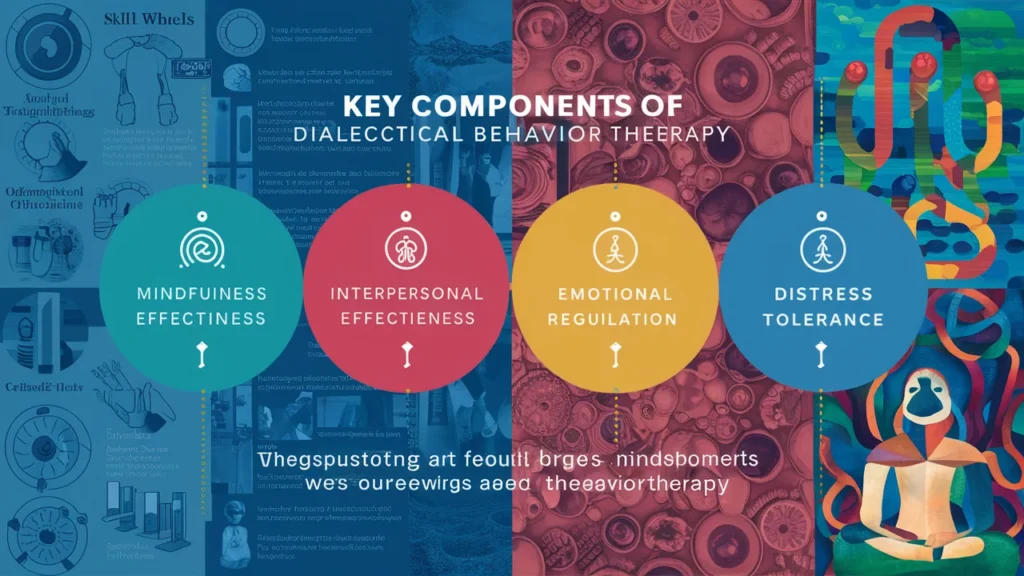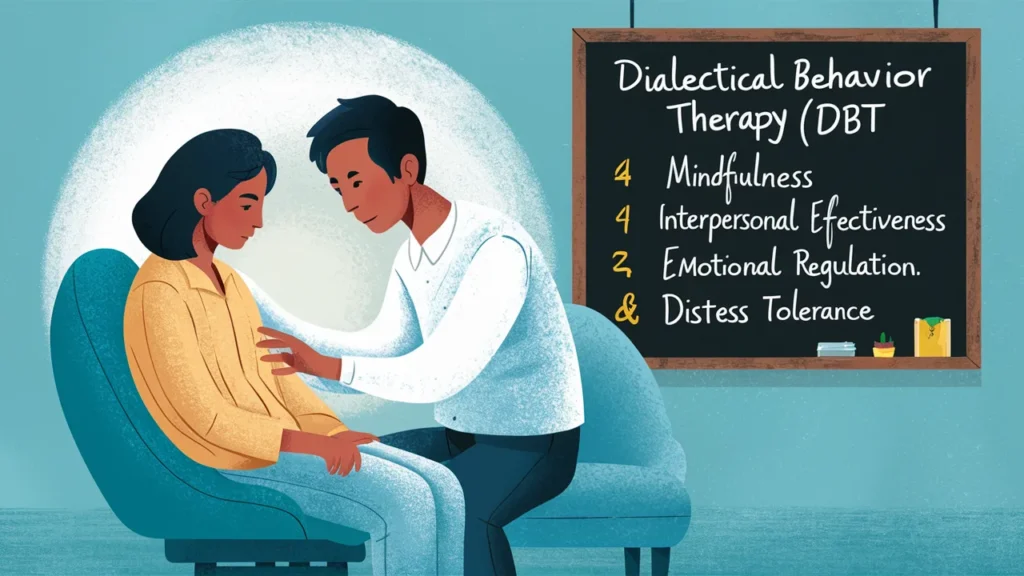Table of Contents
Dr. Marsha Linehan developed Dialectical Behavior Therapy (DBT), a comprehensive cognitive-behavioral treatment, in the late 1980s. Initially, she created DBT to treat borderline personality disorder (BPD). However, therapists have since adapted DBT for various mental health conditions, including depression, anxiety, eating disorders, and substance abuse. DBT integrates standard cognitive-behavioral techniques aimed at regulating emotions and reality-testing. It also incorporates principles of distress tolerance, acceptance, and mindful awareness, which are derived from Buddhist meditative practices. This comprehensive approach enables DBT to effectively address a wide range of emotional and psychological challenges, making it a versatile therapeutic option for individuals aiming to improve their mental health and overall well-being. By integrating these elements, DBT offers a structured framework that helps patients develop healthier coping mechanisms, manage intense emotions, and cultivate a more balanced and mindful perspective on life.

Core Components of Dialectical Behavior Therapy
DBT is structured around four primary components: individual therapy, group skills training, phone coaching, and a therapist consultation team. Each component plays a crucial role in ensuring the effectiveness of the therapy.
- Individual Therapy: One-on-one sessions between the therapist and the client focus on addressing specific issues and setting personal goals. The therapist helps the client apply DBT skills to real-life situations and monitors progress.
- Group Skills Training: These sessions teach clients DBT skills in a group setting. The four main skill modules are mindfulness, interpersonal effectiveness, emotion regulation, and distress tolerance.
- Phone Coaching: Clients can call their therapists between sessions for immediate support and guidance on how to use DBT skills during a crisis.
- Therapist Consultation Team: A team of DBT therapists meets regularly to support each other in delivering effective treatment. This component ensures that therapists maintain their motivation and adherence to DBT principles.
The Four Modules of DBT Skills Training
- Mindfulness: Mindfulness is the practice of being fully present in the moment. It helps individuals become more aware of their thoughts, feelings, and sensations without judgment. This awareness is critical in recognizing and managing emotional responses effectively.
- Interpersonal Effectiveness: This module focuses on improving relationship skills. It teaches strategies for asking for what one needs, saying no, and managing conflict in a way that maintains self-respect and strengthens relationships.
- Emotion Regulation: Emotion regulation skills help individuals understand and manage their intense emotions. Techniques include identifying and labeling emotions, increasing positive emotional experiences, and reducing vulnerability to negative emotions.
- Distress Tolerance: Distress tolerance skills are about surviving crises without making things worse. They involve techniques for accepting and tolerating distressing situations and emotions, rather than trying to change them.

Benefits of Dialectical Behavior Therapy
DBT offers numerous benefits for individuals struggling with emotional and behavioral issues:
- Dialectical Behavior Therapy (DBT)Improved Emotional Regulation: DBT provides tools to help individuals understand and manage their emotions better, reducing the intensity and frequency of emotional outbursts.
- Enhanced Interpersonal Relationships: By learning and practicing interpersonal effectiveness skills, individuals can develop healthier and more fulfilling relationships.
- Increased Mindfulness: The emphasis on mindfulness helps individuals live more fully in the present moment, reducing stress and improving overall mental well-being.
- Dialectical Behavior Therapy Greater Distress Tolerance: DBT equips individuals with strategies to endure and cope with difficult situations and emotions without resorting to self-destructive behaviors.
- Reduced Suicidal and Self-Harming Behaviors: DBT has been particularly effective in reducing suicidal ideation and self-harming behaviors, making it a life-saving treatment for many individuals.

Applications of DBT Beyond Borderline Personality Disorder
While DBT was initially developed for BPD, its applications have expanded to other mental health disorders:
- Depression: DBT can help individuals with depression by teaching skills to manage intense emotions, reduce negative thinking, and build a life worth living.
- Anxiety Disorders: For those with anxiety, DBT’s mindfulness and emotion regulation skills can reduce anxiety symptoms and improve coping mechanisms.
- Eating Disorders: DBT addresses the emotional dysregulation and impulsive behaviors often seen in eating disorders, providing strategies for healthier coping.
- Substance Abuse: DBT has been adapted to treat substance use disorders, helping individuals manage cravings and high-risk situations while maintaining sobriety.
- Post-Traumatic Stress Disorder (PTSD): DBT’s emphasis on emotion regulation and distress tolerance is beneficial for individuals dealing with the aftermath of trauma.

Conclusion: The Efficacy of Dialectical Behavior Therapy
Dialectical Behavior Therapy is a versatile and effective treatment for a wide range of mental health conditions. Its structured approach and emphasis on skill-building make it a powerful tool for individuals seeking to improve their emotional and behavioral health. With its roots in cognitive-behavioral therapy and mindfulness, DBT offers a unique blend of acceptance and change strategies that help individuals build a life worth living. Whether dealing with borderline personality disorder, depression, anxiety, or other mental health challenges, DBT provides a comprehensive framework for achieving lasting positive change.
